1. Overview
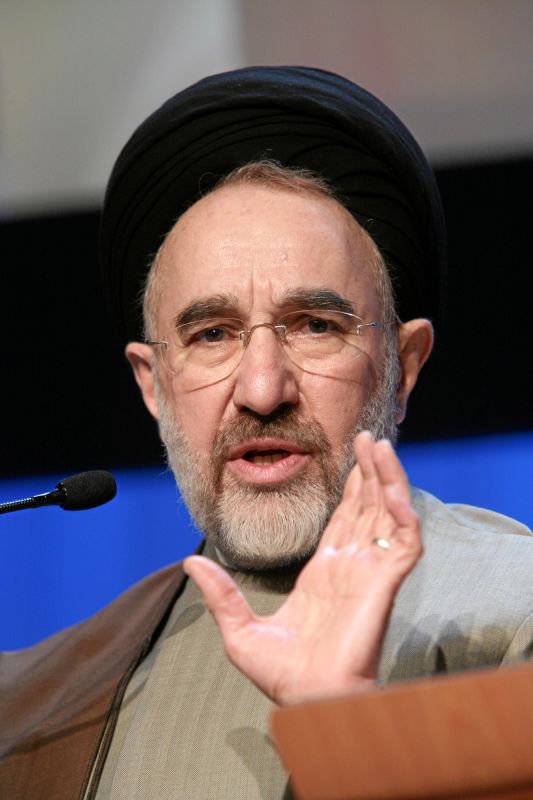
Mohammad Khatami is an Iranian politician and Shia cleric who served as the fifth President of Iran from 1997 to 2005. Before his presidency, he held various significant roles, including Minister of Culture and Islamic Guidance from 1982 to 1992. Khatami gained international attention during his first presidential election in 1997, securing nearly 70% of the vote on a platform centered on liberalization and reform. His presidency was marked by efforts to promote freedom of expression, tolerance, and civil society, while also advocating for constructive diplomatic relations and a free market economic policy. He is widely recognized for proposing the concept of "Dialogue Among Civilizations" as an alternative to the "Clash of Civilizations" theory, a concept later adopted by the United Nations for the year 2001. Despite his popularity and reformist agenda, Khatami faced significant challenges and opposition from conservative factions within the Iranian government, limiting the full implementation of his proposed changes.
2. Early Life and Education
Mohammad Khatami's early life was shaped by his family's clerical background and his pursuit of both traditional Islamic and modern Western education.
2.1. Childhood and Family
Mohammad Khatami was born on 14 October 1943, in the small town of Ardakan in Yazd Province, Iran, into a Sayyid family, indicating descent from the Islamic prophet Muhammad. His father, Ayatollah Ruhollah Khatami, was a high-ranking cleric and the Khatib (sermon deliverer for Friday prayers) in the city of Yazd during the early years of the Iranian Revolution.
Khatami married Zohreh Sadeghi, the daughter of a professor of religious law and niece of Musa al-Sadr, in 1974 when he was 31 years old. They have two daughters, Laila (born 1975) and Narges (born 1980), and one son, Emad (born 1988). His family played an active role in Iranian politics and society. His brother, Mohammad-Reza Khatami, was elected as Tehran's first member of parliament in the 6th term, serving as deputy speaker. He also held the position of secretary-general of the Islamic Iran Participation Front, Iran's largest reformist party, for several years. Mohammad-Reza is married to Zahra Eshraghi, a feminist human rights activist and granddaughter of Ruhollah Khomeini, the founder of the Islamic Republic of Iran. Another brother, Ali Khatami, a businessman with a master's degree in Industrial Engineering from Polytechnic University in Brooklyn, served as President Khatami's Chief of Staff during his second term, maintaining a notably low profile. His eldest sister, Fatemeh Khatami, was elected as the first representative for Ardakan in the 1999 city council elections. It is important to note that Mohammad Khatami is not related to Ahmad Khatami, a hardline cleric and Provisional Friday Prayer Leader of Tehran.
2.2. Education and Intellectual Development
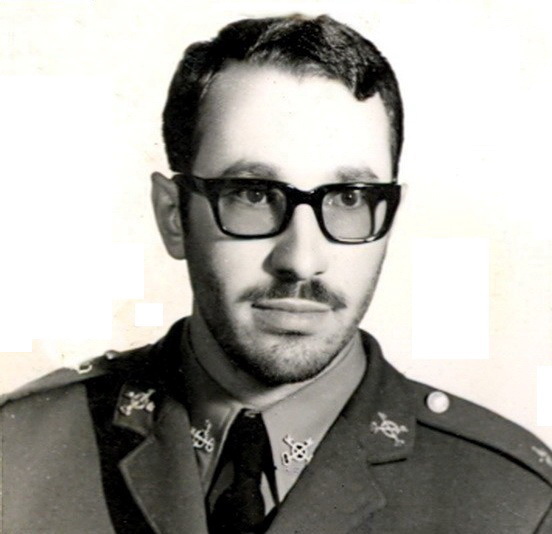
Mohammad Khatami pursued a diverse academic path that blended Western and Islamic intellectual traditions. He earned a BA in Western philosophy from Isfahan University. During his time at Isfahan University, he actively engaged in political activities within the Muslim Student Association. He later enrolled in a master's degree program in educational sciences at Tehran University but left before completing it to dedicate himself to Islamic studies in Qom. In Qom, he spent seven years intensively studying Islamic sciences, completing courses up to the highest level of Ijtihad, which signifies a qualified independent interpreter of Islamic law. This period in Qom also brought him closer to leaders of the Islamic movement.
His intellectual development was significantly influenced by his early studies in Western philosophy, which contributed to his broad perspective. After his studies in Qom, he briefly resided in Germany, where he chaired the Islamic Centre Hamburg from 1978 to 1980, a role that involved coordinating Iranian opposition forces in Europe.
3. Early Career and Political Activities
Before assuming the presidency, Mohammad Khatami held several key positions within the Iranian government and cultural institutions, laying the groundwork for his later reformist agenda.
3.1. Pre-Presidency Career
Upon his return to Iran after the Iranian Revolution, Khatami began his career as a representative in the parliament from 1980 to 1982. He then served as the supervisor of the Kayhan Institute, a major Iranian newspaper, from 1981 to 1988, where he notably championed the freedom of expression for journalists. In 1982, he was appointed Minister of Culture and Islamic Guidance, a position he held until 1986, and then again from 1989 until his resignation on 24 May 1992. During his tenure as culture minister, he earned a reputation as a moderate liberal, easing censorship across cultural sectors, permitting concerts by female singers, and allowing the sale of Western publications within Iran. This approach, however, drew criticism from conservative factions. He also served as the head of military propaganda during the Iran-Iraq War. Following his resignation as culture minister, he became the head of the National Library of Iran from 1992 to 1997. Additionally, he was a member of the Supreme Council of Cultural Revolution.
3.2. Activities as a Reformist Cleric
Khatami was a founding member of the Association of Combatant Clerics, a prominent reformist clerical organization, and has served as the chairman of its Central Council since 2005. His involvement with this group positioned him within the reformist wing of Iranian politics, advocating for cultural openness in contrast to the more rigid stances of conservative clerics. His early reformist activities, particularly during his time as Minister of Culture, demonstrated his commitment to promoting greater freedoms and a more open society, which garnered him significant public support and set the stage for his presidential bid.
4. Presidency (1997-2005)
Mohammad Khatami's two terms as President of Iran were characterized by a strong emphasis on reform, civil society, and improved international relations, though he frequently encountered resistance from conservative elements.
4.1. Election and Presidential Tenure
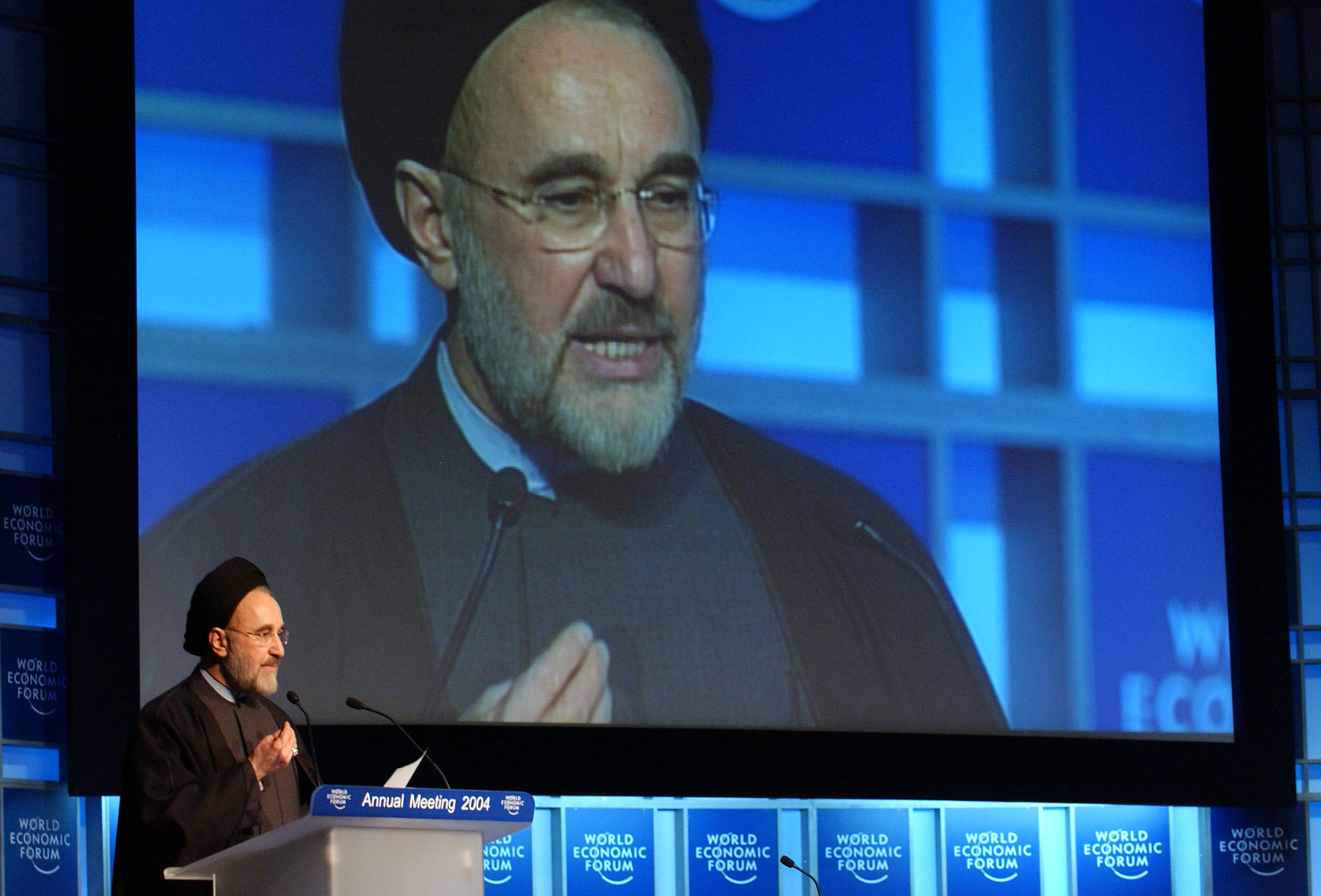
Mohammad Khatami was elected president on 23 May 1997, in what was widely described as a remarkable election. Despite limited television airtime, much of which was allocated to the favored conservative candidate, Ali Akbar Nategh-Nouri, Khatami secured nearly 70% of the vote. Voter turnout was exceptionally high, at almost 80%. Even in Qom, a conservative stronghold and center of theological training, 70% of voters cast their ballots for Khatami. His victory was seen as a prelude to a dynamic reformist thrust, injecting hope into Iranian society and introducing new terms into the political discourse of young Iranians. The day of his election, 2 Khordad, 1376, in the Iranian calendar, is considered the starting date of "reforms" in Iran, leading his followers to be known as the "2nd of Khordad Movement".
Khatami was re-elected on 8 June 2001 for a second term, securing 77.1% of the vote. He stepped down on 3 August 2005, having served the maximum two consecutive terms permitted under the Constitution of the Islamic Republic of Iran. His supporters were a diverse coalition, including traditional leftists, business leaders seeking economic liberalization and foreign investment, and a significant number of younger voters.
4.2. Political Reforms and Civil Society
As Iran's first reformist president, Khatami centered his campaign and presidency on the principles of rule of law, democracy, and the inclusion of all Iranians in the political decision-making process. He advocated for freedom of expression, tolerance, and the strengthening of civil society. During his first term, a relative degree of press freedom emerged, allowing some opposition forces to publish articles criticizing high-ranking officials for the first time since the early 1980s. The Association of Iranian Journalists, the national union for journalists, was established in October 1997 under his presidency. He also supported the completion of the National Library and Archive of Iran. Khatami's ideology promoted concepts such as women's rights, religious tolerance, dialogue, and political development, facing considerable pressure from orthodox seminarians for the changes he championed.
4.3. Economic Policy
Khatami's economic policies largely continued the commitment to industrialization and liberal reforms initiated by the previous government under Akbar Hashemi Rafsanjani. At a macroeconomic level, he pursued policies outlined in Iran's second five-year development plan (2000-2004), which aimed for economic reconstruction within a broader context of social and political development. Key economic reforms included an ambitious program to privatize several major industries, the creation of 750,000 new jobs per year, an average annual real GDP growth of 6% over the period, and a reduction in subsidies for basic commodities, alongside fiscal and structural reforms.
On 10 April 2005, Khatami highlighted economic development, large-scale private sector operations, and a 6% economic growth rate as achievements of his government. He allocated 5.00 B USD to the private sector for economic promotion, with signed contracts reaching 10.00 B USD. However, a year into his first term, Khatami acknowledged Iran's economic challenges, stating that the economy was "chronically ill" and required fundamental restructuring. Unemployment remained a significant problem, with only 300,000 new jobs created in the first year of the plan, falling short of the 750,000 target. A 2004 World Bank report noted that Iran was "slowly emerging from a long period of uncertainty and instability" after 24 years of post-revolutionary strife, international isolation, and economic volatility.
Despite challenges, macroeconomic indicators showed improvement: real GDP growth increased from 2.4% in 1997 to 5.9% in 2000. Unemployment decreased from 16.2% to less than 14%, and the consumer price index fell from over 17% to less than 13%. Both public and private investments grew in the energy, building, and industrial sectors. The country's external debt was significantly reduced from 12.10 B USD to 7.90 B USD, its lowest level since the Iran-Iraq cease-fire. The World Bank granted 232.00 M USD for health and sewage projects after a seven-year hiatus. For the first time since the 1979 financial nationalization, the government authorized the establishment of two private banks and one private insurance company. The OECD lowered Iran's risk factor for doing business from six to four (on a scale of seven).
Despite these efforts, the government's own figures showed that 15.5% of the population lived under the absolute poverty line in 2001 (down from 18% in 1997), and 25% were under relative poverty, classifying approximately 40% of the population as poor. Private estimates indicated even higher figures. In a 2001 world survey of 155 countries, Iran ranked 150th in terms of openness to the global economy. On the United Nations Human Development scale, Iran ranked 90th out of 162 countries, a slight improvement from its previous position of 97th out of 175 countries four years prior. The overall risk of doing business in Iran improved only marginally from "D" to "C". One of Khatami's strategies was to attract foreign and domestic capital for economic privatization. In 2001, the organization of privatization was established, and the government encouraged public investment in private companies through incentives. Iran also successfully persuaded the World Bank to approve loans totaling 432.00 B USD to the country.
4.4. Foreign Policy and International Relations
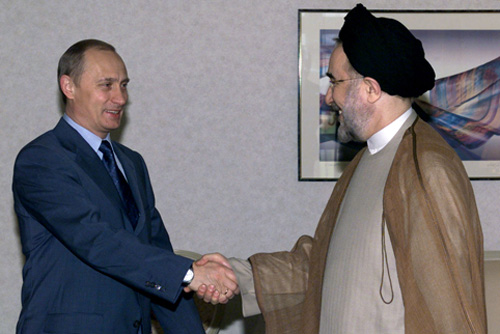
During Khatami's presidency, Iran's foreign policy shifted from confrontation to conciliation. Central to his approach was the concept of "Dialogue Among Civilizations" as an alternative to the "Clash of Civilizations" theory. Relations with the United States remained strained by mutual suspicion, but Tehran increasingly sought to play a more significant role in the Persian Gulf region and beyond.
Khatami engaged in a "Westward charm offensive," becoming the first Iranian president to visit European Union countries such as Austria, France, Germany, Greece, Italy, Norway, and Spain. He frequently delivered speeches at prestigious venues like the University of St Andrews, the World Economic Forum in Davos, and the UNESCO headquarters in Paris, articulating Iran's new vision and aspirations. He met with numerous influential figures, including Pope John Paul II, Koichiro Matsuura, Jacques Chirac, Johannes Rau, Vladimir Putin, Abdulaziz Bouteflika, Mahathir Mohamad, and Hugo Chávez. While he refused to meet militant Iraqi cleric Moqtada al-Sadr in 2003, he attended Hafez al-Assad's funeral in 2000, assuring the new Syrian president, Bashar al-Assad, of Iran's support.
A critical foreign policy challenge arose on 8 August 1998, when the Taliban massacred 4,000 Shias in Mazar-i-Sharif, Afghanistan, and killed 11 Iranian diplomats along with an Iranian journalist, taking others hostage. Despite Ayatollah Khamenei's order to amass over 70,000 Iranian troops near the border for an invasion, Khatami intervened, halting the military action and seeking assistance from the United Nations. This led to negotiations with the Taliban and the eventual release of the diplomats, preventing Iran from entering a war.
After the 2003 Bam earthquake in Iran, the Iranian government rejected Israel's offer of assistance. However, on 8 April 2005, at the funeral of Pope John Paul II, Khatami sat near Iranian-born Israeli President Moshe Katsav due to alphabetical seating. They shook hands and conversed, reportedly about their shared home province in Iran, marking what could be considered the first official political contact between Iran and Israel since diplomatic ties were severed in 1979. Upon his return to Iran, Khatami faced severe criticism from conservatives for this interaction, leading state-run media to report his strong denial of the handshake and conversation. In 2003, Iran also approached the United States with proposals to negotiate all outstanding issues, including the nuclear program and a two-state settlement for Israel and the Palestinians.
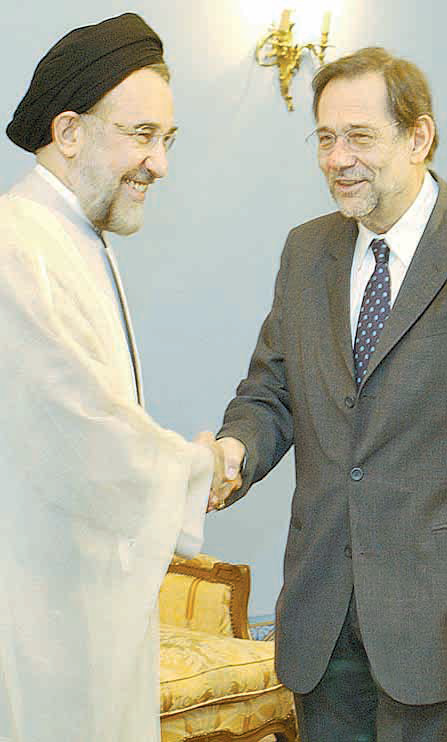
In 2006, as a former president, Khatami became the highest-ranking Iranian politician to visit the United States, excluding annual diplomatic trips to the UN headquarters. He delivered speeches at the Washington National Cathedral, Harvard University, Georgetown University, and the University of Virginia, continuing his advocacy for dialogue.
4.4.1. Currency crisis
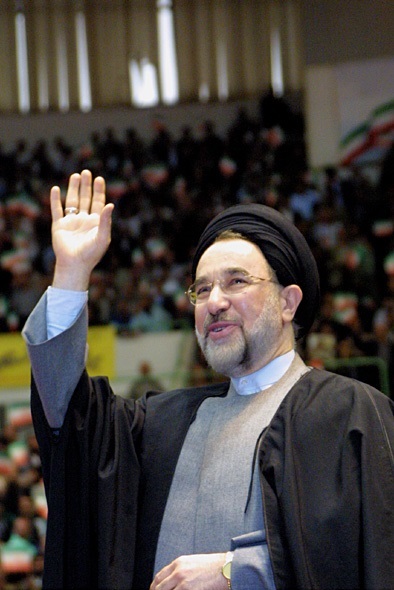
From 1995 to 2005, Khatami's administration managed to slow the depreciation of the Iranian rial more effectively than previous governments. Nevertheless, the currency continued to fall from 2.05 K IRR to 9.01 K IRR against the U.S. dollar during his two terms as president.
4.5. Cultural Policy and Social Impact
Khatami's moderate policies sharply contrasted with those of his radical opponents who sought stricter Islamic rule. His inclusive and pluralistic message offered hope for a nation desiring change that preserved Iran's Islamic republican system while diverging from the experiences of the 1979 revolution.
In the early years of his presidency, a relative degree of press freedom emerged, allowing opposition forces to publish articles criticizing high-ranking officials for the first time since the early 1980s. Banned books, such as Kelidar, were allowed to be printed. The cinema industry also experienced greater openness, with filmmakers like Bahram Beyzai and Abbas Kiarostami actively engaged. Many filmmakers began focusing on social themes. The Iran Music House and the Music Festival of Iran's regions were established during this period, and the Iran's National Orchestra was founded in 1998 under the conduction of Farhad Fakhreddini.
4.6. Challenges and Conflicts with Conservatives
Khatami's reformist policies led to repeated clashes with hardline and conservative Islamists within the Iranian government. These factions controlled powerful institutions such as the Guardian Council, whose members are appointed by the Supreme Leader. As president, Khatami was outranked by the Supreme Leader and thus lacked legal authority over key state institutions, including the armed forces, police, army, Revolutionary Guards, state media, and prisons.
Khatami presented the "twin bills" to parliament during his term. These proposed legislations aimed to introduce small but crucial changes to national election laws and provide a clear definition of the president's power to prevent constitutional violations by state institutions. Khatami viewed these bills as essential for the progress of reforms in Iran. Although approved by the parliament, the bills were ultimately vetoed by the Guardian Council.
The 2004 parliamentary elections further highlighted the challenges. The Guardian Council disqualified thousands of candidates, including most reformist members of parliament and all candidates from the Islamic Iran Participation Front party, leading to a conservative victory with at least 70% of the seats. Approximately 60% of eligible voters participated. Khatami strongly opposed holding an election he deemed unfair and unfree. He recounted a meeting with Supreme Leader Khamenei and the Parliament's spokesman, where they presented a list of conditions for holding the elections. Khatami stated that the Guardian Council, whose members are appointed by the Supreme Leader and are seen as implementing his will, failed to uphold its word. Faced with the choice between holding the election or risking widespread unrest that could damage the regime, Khatami proceeded with the election, rejecting the resignations of his cabinet ministers and provincial governors. This decision signaled a split between the radical and moderate wings of the reformist movement.
5. Thought and Philosophy
Mohammad Khatami's intellectual contributions are rooted in his unique blend of Islamic and Western thought, particularly evident in his concepts of dialogue and democracy.
5.1. Dialogue Among Civilizations
Building on earlier works by philosopher Dariush Shayegan, Khatami introduced the theory of "Dialogue Among Civilizations" during his 1997 presidential campaign as a direct response to Samuel P. Huntington's "Clash of Civilizations" theory. He formally presented this concept at the United Nations in 1998. Consequently, on 4 November 1998, the UN adopted a resolution proclaiming the year 2001 as the "United Nations' Year of Dialogue Among Civilizations," based on Khatami's suggestion. Advocating for the moralization of politics, Khatami argued that "the political translation of dialogue among civilizations would consist in arguing that culture, morality, and art must prevail on politics." His call for dialogue prompted a published reply from American author Anthony J. Dennis, who originated and edited Letters to Khatami: A Reply To The Iranian President's Call For A Dialogue Among Civilizations, published in 2001. This book remains the only published Western reply Khatami has received.
5.2. Views on Freedom, Tolerance, and Democracy
Khatami's philosophical stance on core liberal values is central to his political thought. He articulates a strong belief in freedom of expression, tolerance, and civil liberties, advocating for democratic principles within the framework of an Islamic republic. He recognized that modern Iranian youth are exposed to new ideas and foreign influences, believing that restricting them could lead to alienation from the regime and a turn towards "Satanic cultures" like MTV, ultimately fostering secularization.
In his "Letter for Tomorrow," he wrote that his government was proud to announce it had heralded an era where the sanctity of power was replaced by the legitimacy of critique and criticism of that power. This power, entrusted to the people's representatives through franchise, was once considered divine grace but had now been reduced to an earthly authority subject to evaluation by earthly beings. He emphasized that despite some lingering traces of despotic backgrounds preventing fair critique, it was incumbent upon society, especially the elite and intellectuals, not to remain indifferent at the dawn of democracy and to prevent freedom from being hijacked.
5.3. Academic Pursuits
Khatami's main research field is political philosophy. One of his academic mentors was Javad Tabatabaei, a prominent Iranian political philosopher. Khatami later became a university lecturer at Tarbiat Modares University, where he taught political philosophy. In 1999, he published a book on political philosophy, covering similar ground to Tabatabaei's work, including the Platonizing adaptation of Greek political philosophy by Farabi (died 950), the synthesis of Persian statecraft by Abu'l-Hasan Amiri (died 991) and Mushkuya Razi (died 1030), the juristic thoughts of al-Mawardi and al-Ghazali, and Nizam al-Mulk's treatise on statecraft. He concluded with a discussion of the revival of political philosophy in Safavid Isfahan in the second half of the 17th century. Like Tabatabaei, Khatami also explored the "decline" of Muslim political thought from its early stages after Farabi. He highlighted the shortcomings of Muslim political thought by contrasting it with the Aristotelian view of politics. Khatami also lectured on this decline in terms of the transition from political philosophy to royal policy (siyasat-i shahi) and attributed it to the prevalence of "forceful domination" (taghallub) in Islamic history.
6. Post-Presidency Career
After completing his two terms as president in 2005, Mohammad Khatami continued to be an influential figure in Iran and on the international stage, primarily through his non-governmental organizations and public engagements.
6.1. Establishment and Operation of NGOs
Following his presidency, Khatami founded and currently heads two non-governmental organizations:
- International Institute for Dialogue among Cultures & Civilizations: This is a private institute, distinct from a similarly named center operated by Iran's foreign ministry. Its European branch, registered as the Foundation for Dialogue among Civilizations, is headquartered in Geneva.
- Baran Foundation: The name BARAN is a Persian acronym for "Foundation for Freedom, Growth and Development of Iran." Also a private institute, it was founded by Khatami and a group of his former colleagues, with its registration announced on 9 September 2005. This organization focuses primarily on domestic activities rather than international ones.
6.2. International Engagements and Public Speaking
Khatami's post-presidency career has included numerous international engagements and public speaking roles. On 2 September 2005, then UN Secretary-General Kofi Annan appointed him as a member of the Alliance of Civilizations. On 28 September 2005, Khatami officially retired after 29 years of government service. On 14 November 2005, he urged all religious leaders to advocate for the abolishment of atomic and chemical weapons. He formally inaugurated the office of his International Institute of Dialogue Among Civilizations on 30 January 2006, and announced the formal registration of its European office in Geneva on 15 February 2006.
On 28 February 2006, while attending an Alliance of Civilizations conference in Doha, Qatar, Khatami stated that "The Holocaust is a historical fact," but added that Israel had "made a bad use of this historic fact with the persecution of the Palestinian people." During a visit to Washington, D.C. on 7 September 2006, he called for dialogue between the United States and Iran. From 24-28 January 2007, he attended the Annual Meeting of the World Economic Forum in Davos, Switzerland, where he shared opinions with then-U.S. Senator John Kerry.


In October 2009, the Global Dialogue Prize committee declared Khatami and Iranian cultural theorist Dariush Shayegan as joint winners of the inaugural award, recognizing their work in developing and promoting the concept of a "dialogue among cultures and civilizations" as a new paradigm for cultural subjectivity and international relations. However, in January 2010, Mohammad Khatami stated he was "not in the position to accept the award," and the prize was given solely to Dariush Shayegan.
On 22 December 2005, a few months after his presidency, the monthly magazine Chelcheragh, along with young Iranian artists and activists, organized a ceremony in his honor titled "A Night with The Man with the Chocolate Robe." The event, which drew a large attendance of teenagers and young adults, garnered significant media attention, with some reports describing the atmosphere as "similar to a concert!" and Khatami being treated "like a pop star."
In October 2008, Khatami organized an international conference on the position of religion in the modern world. Invited speakers included former UN Secretary-General Kofi Annan, former Norwegian Prime Minister Kjell Magne Bondevik, former Italian Prime Minister Romano Prodi, former French Prime Minister Lionel Jospin, former Swiss President Joseph Deiss, former Portuguese President Jorge Sampaio, former Irish President Mary Robinson, and former UNESCO director-general Federico Mayor, among other scholars. The event was followed by a celebration of the historical city of Yazd, Khatami's birthplace. He also announced plans to launch a television program to promote intercultural dialogue.
6.3. Post-Presidency Political Stance
Khatami remained a significant figure in Iranian politics after his presidency. He considered running in the 2009 Iranian presidential election, with 194 alumni of Sharif University of Tech writing a letter in December 2008 urging him to run against Mahmoud Ahmadinejad "to save the nation." On 8 February 2009, he announced his candidacy at a meeting of pro-reform politicians. However, on 16 March 2009, Khatami officially withdrew from the race to endorse his long-time friend and adviser, former prime minister Mir-Hossein Mousavi, believing Mousavi had a better chance against Iran's conservative establishment to deliver genuine change and reform. Following the suppression of the post-election protests, Khatami was described as an "insider" politician, working on a "list of preconditions" for reformist participation in upcoming parliamentary elections. This move was seen by some as astute, forcing the system to reveal its unwillingness to take basic democratic steps. In response, the Kayhan newspaper condemned Khatami as "a spy and traitor" and called for his execution.
Leading up to the June 2013 presidential election, several reformist groups invited Khatami to participate. In December 2012, reformists also sent a letter to Supreme Leader Ayatollah Ali Khamenei regarding Khatami's potential participation. However, on 11 June 2013, Khatami, along with a council of reformists, backed moderate Hassan Rouhani in Iran's presidential vote after advising Mohammad Reza Aref to withdraw from the race, stating it "would not be wise" for him to continue.

7. Personal Life
Mohammad Khatami's personal life reflects his deep family ties and his broad intellectual and linguistic capabilities.
7.1. Family and Marriage
Mohammad Khatami married Zohreh Sadeghi in 1974. The couple has three children: two daughters, Laila and Narges, and one son, Emad. His family is well-connected within Iran's political and religious circles, notably through his wife's lineage and his brother Mohammad-Reza Khatami's marriage to Zahra Eshraghi, a granddaughter of Ruhollah Khomeini.
7.2. Languages and Other Backgrounds
In addition to his native language, Persian, Mohammad Khatami is fluent in Arabic, English, and German. His linguistic abilities have facilitated his extensive international engagements and his deep engagement with both Islamic and Western philosophical traditions.
8. Assessment and Impact
Mohammad Khatami's presidency and subsequent political activities have left a complex and often debated legacy in Iran, marked by both significant reforms and unfulfilled aspirations.
8.1. Positive Assessments
Khatami is widely regarded as Iran's first reformist president, whose tenure brought a surge of hope for greater openness and democracy. His supporters credit him with initiating a "dynamic reform thrust" that revitalized a nation weary from the Iran-Iraq War and costly reconstruction. His emphasis on rule of law, democracy, and the inclusion of all Iranians in the political process was seen as a crucial step towards modernizing the Islamic Republic.
His concept of "Dialogue Among Civilizations" significantly improved Iran's international image, fostering constructive diplomatic relations with various countries, including those in Asia and the European Union. This initiative was recognized globally when the United Nations proclaimed 2001 as the "Year of Dialogue Among Civilizations" at his suggestion. Domestically, his cultural policies led to a period of relative freedom of the press, the establishment of professional journalistic organizations, and a more vibrant cultural scene, including a flourishing cinema that explored social themes. He represented a vision of change that sought to preserve Iran's Islamic republican system while promoting greater freedoms and a pluralistic society.
8.2. Criticisms and Controversies
Despite the initial widespread enthusiasm, Khatami's two terms as president are often viewed by some in the Iranian opposition as ultimately unsuccessful or incomplete in achieving their goals of making Iran more free and democratic. He faced persistent and formidable obstruction from hardline and conservative elements within the clerical establishment, who controlled powerful state institutions like the Guardian Council. This limited his ability to implement significant reforms, as evidenced by the veto of his "twin bills" aimed at electoral reform and defining presidential powers.
Critics point to the continued economic challenges, including high unemployment and the persistent fall in the value of the Iranian rial, as areas where his administration fell short. His inability to break the conservative grip on the judiciary and other key state institutions led to widespread disappointment and, for some, political apathy, which arguably contributed to the victory of hardline conservative Mahmoud Ahmadinejad in the 2005 presidential election. In his 47-page "A Letter for Tomorrow," Khatami himself acknowledged that his government had faced significant obstacles from hardline elements, preventing the full realization of its noble principles. The "Man with the Chocolate Robe" event, while showing his popularity, also saw some bloggers accuse him of failing to deliver on his promises for a safer, more democratic Iran.
9. Writings and Publications
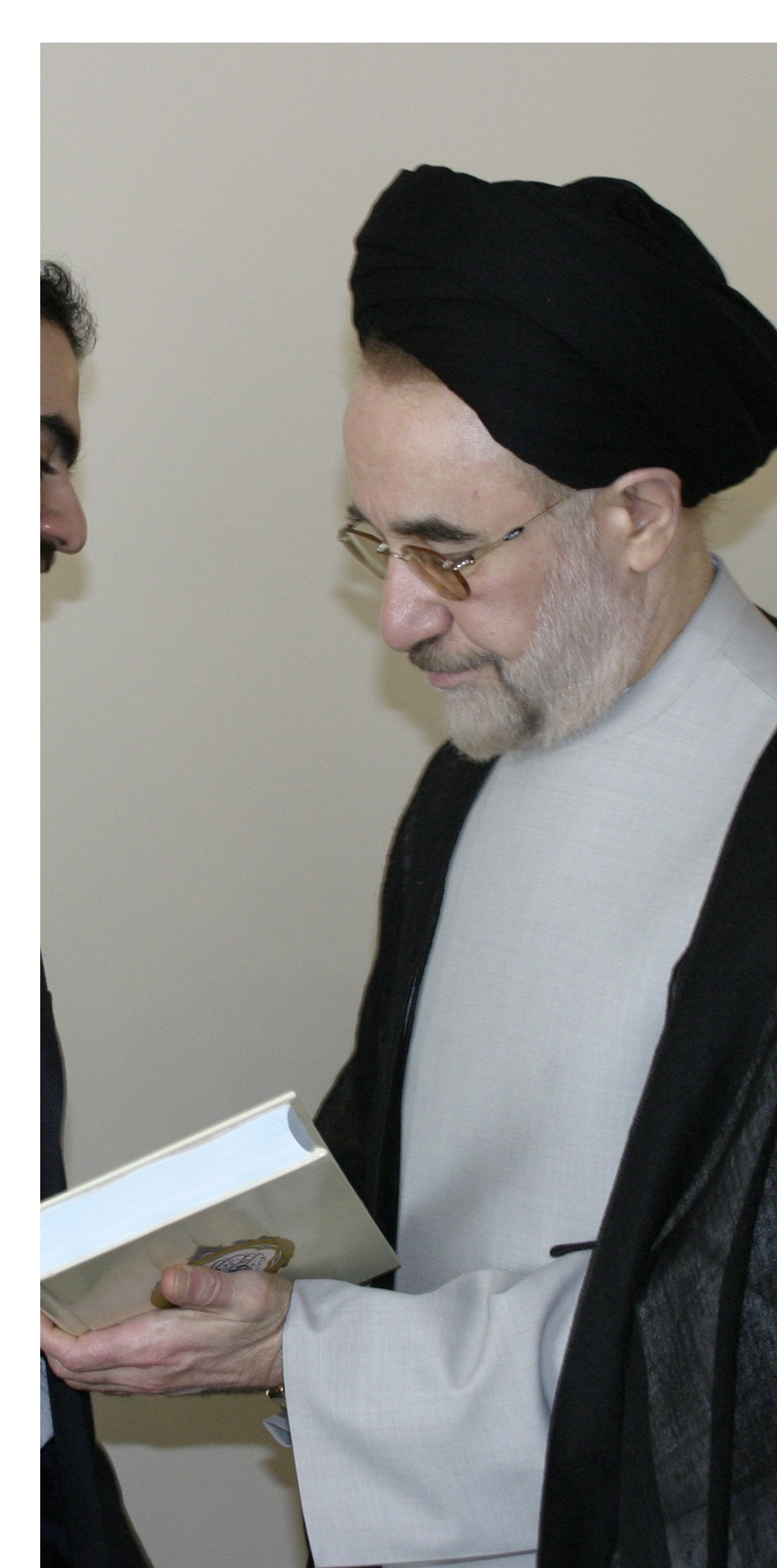
Mohammad Khatami has authored numerous books and articles in Persian, Arabic, and English, reflecting his diverse intellectual interests in philosophy, politics, and culture.
Books in Persian
- Fear of the Wave (بیم موجBīm-e MowjPersian)
- From the World of a City to the City of the World (از دنیای شهر تا شهر دنیاAz Donya-ye Shahr ta Shahr-e DonyaPersian)
- Faith and Thought Trapped by Despotism (آیین و اندیشه در دام خودکامگیĀyīn va Andīsheh dar Dām-e KhodkāmagīPersian)
- Democracy (مردم سالاریMardom SālārīPersian)
- Dialogue Among Civilizations (گفتگوی تمدنهاGoftogū-ye Tamaddon-hāPersian)
- A Letter for Tomorrow (نامه ای برای فرداNāmeh-ī Barā-ye FardāPersian)
- Islam, The Clergy, and The Islamic Revolution (اسلام، روحانیت و انقلاب اسلامیEslām, Rowhāniyat va Enqelāb-e EslāmīPersian)
- Political Development, Economic Development, and Security (توسعه سیاسی، توسعه اقتصادی و امنیتTowse'eh-ye Sīyāsī, Towse'eh-ye Eqtesādī va AmniyatPersian)
- Women and the Youth (زنان و جوانانZanān va JavānānPersian)
- Political Parties and the Councils (احزاب و شوراهاAhzāb va ShowrāhāPersian)
- Reviving Inherent Religious Truths (احیاگر حقیقت دینEhyāgar-e Haqīqat-e DīnPersian)
Books in English
- Islam, Liberty and Development
Books in Arabic
- A Study of Religion, Islam and Time (مطالعات في الدين والإسلام والعصرMuṭālaʿāt fī al-Dīn wa al-Islām wa al-ʿAṣrArabic)
- City of Politics (مدينة السياسةMadīnat al-SiyāsaArabic)
10. Awards and Honors
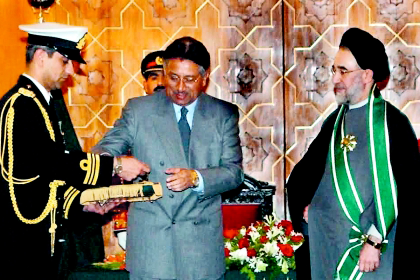
Mohammad Khatami has received numerous awards, honorary degrees, and recognitions from various institutions worldwide throughout his career.
- Gold medal from University of Athens
- The special medal of Spain's Congress of Deputies and Senate, Key to Madrid
- Honorary PhD, Moscow State Institute of International Relations
- Honorary doctorate in Philosophy from University of Moscow
- Honorary PhD degree, Tokyo Institute of Technology
- Honorary doctorate degree by the Delhi University
- Honorary doctorate from National Academy of Sciences of Azerbaijan
- Degree of honor in political sciences, Lebanese University
- Pakistan's highest civilian honour, Nishan-e-Pakistan
- Plaque of honor and medal of distinction by the International Federation for Parent Education
- Honorary doctorate from Al-Neelain University
- Honorary doctorate of Law from University of St Andrews
- Venezuela's Order of the Liberator
11. Electoral History
| Year | Election | Votes | % | Rank | Notes |
|---|---|---|---|---|---|
| 1980 | Parliament | 32,942 | 82.1 | 1st | Won |
| 1992 | Parliament | - | Disqualified | ||
| 1997 | President | 20,078,187 | 69.6 | 1st | Won |
| 2001 | President | 21,659,053 | 77.1 | 1st | Won |
12. External links
- [https://web.archive.org/web/20080606014709/http://baran.org.ir/ Official website of Khatami's BARAN NGO Institute in Iran]
- [http://www.khatami.ir Official website of Mohammad Khatami]
- [http://dialogue.ir/ Khatami's International Institute for Dialogue among Cultures & Civilizations]
- [https://www.c-span.org/person/?52963 Mohammad Khatami on C-SPAN]
- [http://www.stanford.edu/group/sjir/6.1.04_siddiqi.html Khatami and the Search for Reform in Iran (Review article; Stanford University)]
- [https://www.britannica.com/eb/article-9218417 Biography in Encyclopædia Britannica]
- [http://www.bbc.co.uk/persian/iran/story/2005/08/050801_pm-mv-khatami-profile.shtml Khatami: From the presidency of Islamic Center in Hamburg to the presidency of Islamic Republic of Iran]
- [http://www.cnn.com/WORLD/9801/07/iran/interview.html CNN: Transcript of Interview with Iranian President Mohammad Khatami]
- [http://news.bbc.co.uk/2/hi/asia-pacific/4703260.stm Iran's ex-leader sees new Islam]
- [https://www.youtube.com/watch?v=z3V5gtpQK2Q Address at World Economic Forum, Davos, 2004]